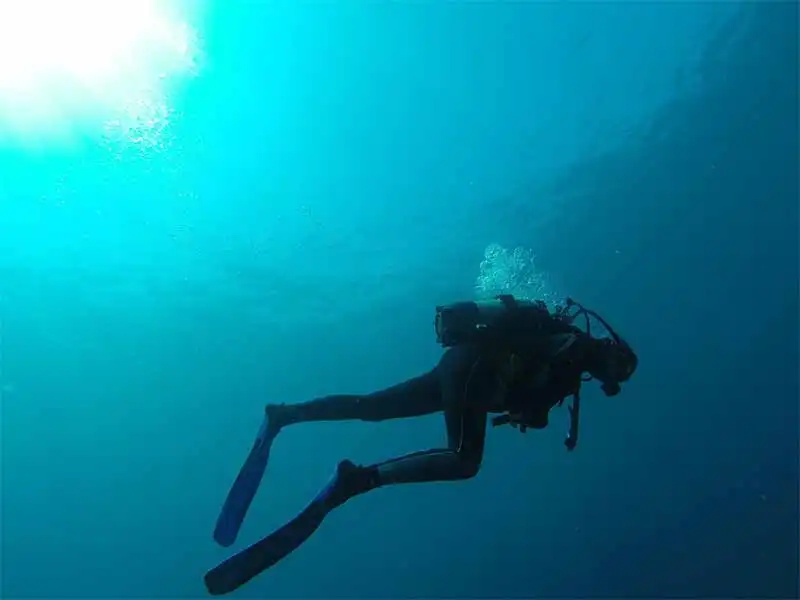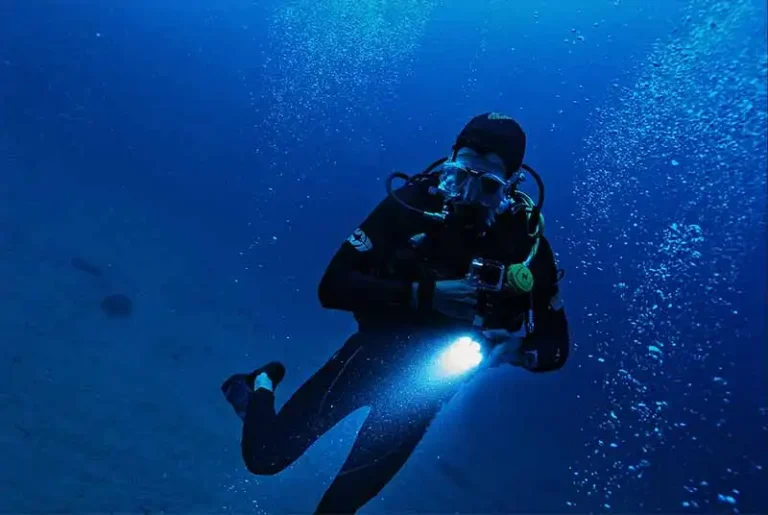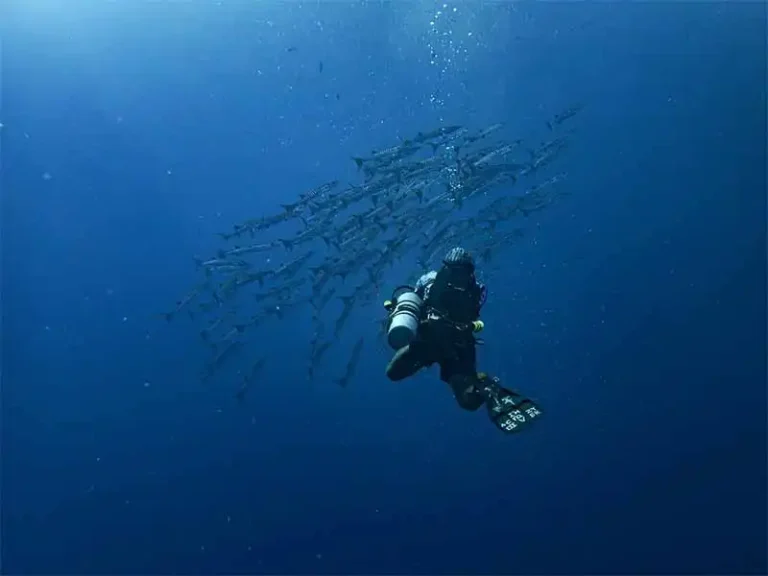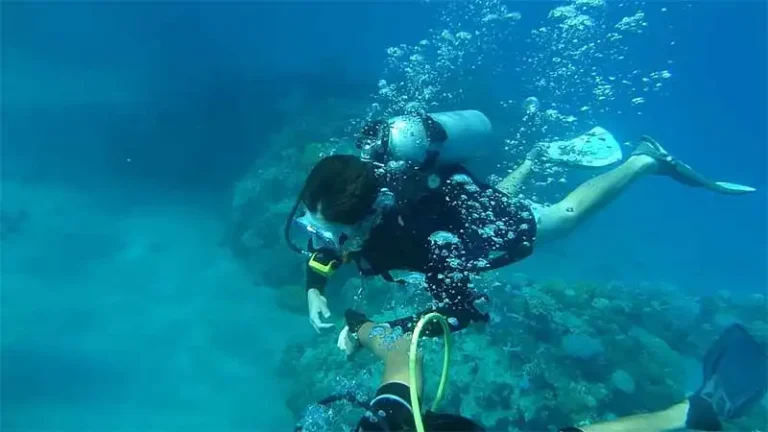5 Best Scuba Diving Masks of 2025
When scuba diving, having the right gear is essential for a safe and enjoyable experience, and the best scuba diving masks are no exception.
A high-quality mask ensures clear vision, comfort, and durability, allowing divers to explore underwater without distraction.
Whether you’re a beginner or an experienced diver, choosing the perfect mask can enhance your dive, making it more enjoyable and stress-free.
In this guide, we’ll explore the top scuba diving masks on the market, highlight their key features, and provide tips to help you make an informed decision.
What are the Best Scuba Diving Masks?
Here are the top picks of the best scuba diving masks,
Atomic Aquatics Scuba Diving Mask
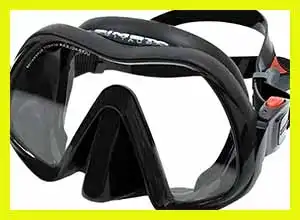
Cressi Perfect View Scuba Diving Mask
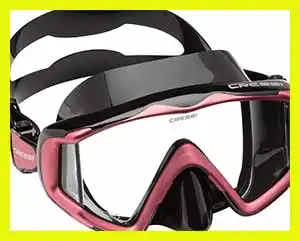
Hollis M1 Scuba Diving Mask
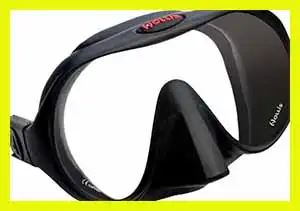
ScubaPro Solo Scuba Diving Mask
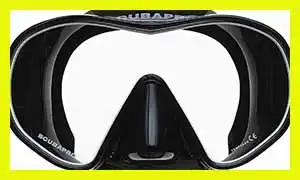
TUSA Freedom Elite Scuba Diving Mask
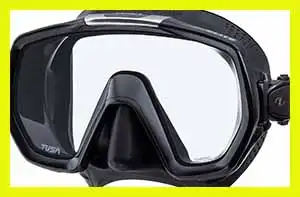
Buyer’s Guide: How to Choose Scuba Diving Masks
Scuba diving is an exhilarating adventure, but to fully immerse yourself in the underwater world, having the right equipment is essential.
Among the most important pieces of gear for divers is the scuba diving mask. Whether you’re a beginner or an experienced diver, selecting the best scuba diving mask is key to ensuring clear vision, comfort, and safety during your dives.
A mask that fits well and suits your specific needs can significantly enhance your diving experience, allowing you to focus on the beauty of the ocean rather than dealing with discomfort or blurry vision.
In this guide, we’ll help you navigate the wide variety of masks available on the market today.
We’ll dive into the key features to consider when choosing the perfect mask for your needs, from lens type to fit and comfort.
Whether you’re looking for a budget-friendly option, a high-performance mask, or one tailored for specific conditions like prescription lenses or fog resistance, we’ve got you covered.
Read on to discover the best scuba diving masks for your next underwater adventure and find the perfect fit for your diving style.
Why Scuba Diving Masks Are Important
When it comes to scuba diving, your mask is not just a piece of gear—it’s a crucial component that directly impacts your safety, comfort, and overall diving experience.
A high-quality scuba diving mask can make all the difference between an enjoyable dive and one filled with frustration.
Here’s why investing in the best scuba diving mask is essential:
Clear Vision Underwater
A scuba diving mask creates an air pocket around your eyes, allowing you to see clearly underwater, free from distortion.
Without a mask, the pressure and saltwater can cloud your vision, making it difficult to navigate and explore the environment.
Whether you’re admiring vibrant coral reefs or spotting marine life, having crystal-clear vision is essential.
High-performance scuba diving masks are designed with advanced lens technologies to enhance clarity and reduce glare, ensuring a safe and enjoyable dive.
Comfort and Fit
One of the most important factors when selecting a scuba diving mask is how it fits your face.
A well-fitting mask prevents water from leaking in, which can cause discomfort and disrupt your dive.
A mask that doesn’t fit properly can cause pressure points, leading to irritation or discomfort, while leaks can obscure your vision and create panic underwater.
Choosing the right mask with the appropriate skirt material, such as silicone, ensures a snug, secure fit that conforms to the shape of your face, maximizing comfort during long dives.
Safety
Safety is a top priority when diving, and your scuba diving mask plays a key role in protecting your vision.
A properly fitted mask not only prevents leaks but also ensures that you can maintain clear visibility in critical situations.
For example, during a deep dive or in low-light conditions, being able to see clearly is vital to avoid hazards and navigate safely.
A high-quality mask with features like easy-to-clear valves or sturdy straps can also provide peace of mind in emergency situations.
Enhanced Diving Experience
A well-designed scuba diving mask can significantly enhance your overall diving experience. Specialty masks, such as those with wide lenses or panoramic views, offer a broader field of vision, allowing you to take in more of your surroundings.
Additionally, prescription scuba diving masks cater to those with vision impairments, enabling them to enjoy the underwater world without needing to wear contacts or struggle with poor sight.
These masks help you stay focused on the dive, adding to the enjoyment and reducing the stress of dealing with vision issues or discomfort.
In summary, the best scuba diving masks are designed to improve your comfort, safety, and visibility underwater, making them an essential piece of equipment for any diver.
Key Features to Consider When Choosing Best Scuba Diving Masks
Selecting the best scuba diving mask is not just about picking one that looks good; it’s about choosing a mask that enhances your diving experience by providing optimal comfort, clear vision, and durability.
To make the right choice, it’s essential to understand the key features that can affect your overall experience.
Here’s a breakdown of the most important factors to consider when shopping for the perfect mask:
Lens Type and Design
The lens is one of the most critical features to consider when choosing a scuba diving mask.
There are several types of lens designs, each offering unique benefits:
- Single-lens Masks: These masks have one large lens, offering an unobstructed field of vision. This design can also make the mask lighter and more streamlined.
- Dual-lens Masks: Dual-lens designs are more common and offer flexibility with interchangeable lenses, such as prescription lenses. They also allow for more efficient air flow inside the mask, preventing fogging.
- Panoramic Lenses: These masks provide a wider field of view, allowing divers to see more of their surroundings. This is ideal for those who want an expansive, clear view of the underwater world.
Additionally, most masks are made with tempered glass for enhanced durability and safety. Tempered glass is more resistant to impact and is less likely to break under pressure, which is crucial when diving in challenging environments.
Some masks also feature UV protection or anti-reflective coatings, which help reduce glare and protect your eyes from harmful rays while diving in bright or shallow waters.
Fit and Skirt Material
A proper fit is essential for comfort and functionality, as a poor-fitting mask can lead to leaks or pressure points.
Here’s how to ensure the best fit:
Fit Test
To test whether a mask fits properly, press the mask to your face without using the straps. Inhale gently through your nose—if the mask stays in place without you holding it, that’s a good sign it’s a proper fit.
Make sure the skirt sits comfortably on the contours of your face, creating a reliable seal.
Skirt Material
Most high-quality scuba masks feature skirts made from silicone, a flexible and comfortable material.
Silicone conforms to your face for a tight, leak-free seal while being gentle on the skin. It’s also durable and resistant to damage from saltwater or UV exposure, ensuring long-lasting use.
Straps and Buckles
The straps and buckles are essential for adjusting the fit and ensuring the mask stays securely in place during your dive.
Look for:
Easy Adjustment Mechanisms
Masks with easy-to-use adjustment straps allow for quick tightening or loosening, ensuring a personalized fit.
Some models include soft-touch buckles that are simple to operate even when wearing gloves.
Quick-release Buckles
Quick-release buckles provide convenience, allowing divers to remove the mask quickly in case of an emergency or when not in use.
These buckles also help with adjusting the mask’s fit on the go, which is particularly useful in changing conditions.
Field of Vision
The wider the field of vision, the more enjoyable and immersive your dive will be.
There are a few key considerations:
Panoramic vs. Traditional Views
Panoramic masks, with wider side windows, offer an expansive view of the underwater environment, which is perfect for those who want to see more of the ocean floor or marine life around them.
Traditional two-lens designs may provide a more focused view but are still excellent for most diving situations.
Peripheral Vision
Look for masks that allow for clear peripheral vision, which is crucial for spotting underwater creatures or navigating challenging dive sites.
A larger field of view means you won’t miss out on important details during your dive.
Prescription Lens Compatibility
For divers who wear corrective lenses, it’s important to choose a scuba diving mask that can accommodate your vision needs:
Some masks offer the option to insert prescription lenses directly into the mask. This eliminates the need for contact lenses or special diving glasses, allowing you to see clearly without discomfort or hassle.
Make sure the mask is compatible with the specific prescription lenses you require.
Fog-Resistance Features
One of the most frustrating issues divers face is fogging inside the mask. Fortunately, many modern scuba masks are designed with built-in features to combat fogging:
Anti-Fog Coatings
Many masks come with anti-fog coatings on the lens to reduce fogging. Some masks even feature pre-treated lenses that are resistant to fog buildup, ensuring clearer vision throughout your dive.
Proper Ventilation
Masks with well-designed vents allow air to circulate inside the mask, reducing the chances of fogging.
A mask with a one-way purge valve can also help by removing any water that enters the mask, making it easier to clear the mask when needed.
Durability and Build Quality
A scuba diving mask is an investment in your diving experience, so it’s essential to choose a mask made from high-quality materials:
Material Quality
Look for masks made from high-grade silicone, tempered glass, and reinforced plastics. These materials are durable, resistant to wear and tear, and can withstand the demands of frequent diving.
Brand Reliability
Choose a reputable brand known for its quality and reliability. Trusted brands often offer longer warranties and better customer support, ensuring your mask will perform well for many dives to come.
By considering these key features, you can ensure that you select the best scuba diving mask that suits your diving style, needs, and comfort preferences.
A quality mask not only enhances your underwater experience but also provides long-term reliability and safety during your dives.
Maintenance and Care Tips for Scuba Diving Masks
Taking proper care of your scuba diving mask is essential to ensure its longevity, functionality, and clarity during each dive.
With the right maintenance, your mask will continue to perform well, providing clear vision and a comfortable fit throughout your diving adventures.
Below are some key maintenance and care tips to help keep your mask in top condition.
Pre-Dive Preparation
To ensure your scuba diving mask performs optimally, it’s important to prepare it properly before each dive:
Anti-Fog Sprays or Toothpaste
One of the most common issues divers face is fogging. To prevent this, apply an anti-fog spray or use a small amount of toothpaste to treat the inside of the mask lens.
Toothpaste can remove manufacturing residues that may contribute to fogging. After applying, gently scrub and rinse the lens before each dive.
Ensure Clean and Dry Mask
Before putting your mask on, always ensure it is clean and dry. Any dirt, oils, or moisture can cause irritation or impair the mask’s seal and fit.
Wipe the lens with a soft, microfiber cloth to remove any smudges or debris. This will help maintain the clarity and comfort of your mask during the dive.
Post-Dive Cleaning
After each dive, take the time to properly clean and care for your scuba diving mask:
Rinse with Fresh Water
As soon as you surface, rinse your mask thoroughly with fresh water to remove any saltwater, sand, or debris.
This prevents the buildup of minerals and particles that can degrade the mask’s material over time, especially around the silicone skirt and the lens.
Use Mild Soap for Cleaning
For a more thorough cleaning, use mild soap or a specialized mask cleaning solution. Avoid harsh detergents or chemicals that can break down the silicone or damage the lens coating.
Gently clean the mask using a soft cloth or sponge, ensuring that all areas, including the strap and skirt, are properly washed.
Storage
Proper storage is key to maintaining your scuba diving mask and ensuring it remains in good condition for your next dive:
Store in a Cool, Dry Place
After cleaning, store your mask in a cool, dry place away from direct sunlight or heat sources.
Prolonged exposure to sunlight or heat can cause the silicone skirt to deteriorate or the mask’s lens to warp, reducing its effectiveness and lifespan.
Use a Protective Case
A protective case is a great investment to prevent your mask from getting scratched, cracked, or damaged during transport or when not in use.
Many cases are designed specifically to fit masks, offering extra padding and protection.
Avoid Common Pitfalls
To extend the life of your scuba diving mask and keep it in top shape, here are some things to avoid:
Avoid Direct Sunlight
Don’t leave your mask exposed to direct sunlight for long periods, as UV rays can cause the silicone to degrade or discolor.
Extended sun exposure can also damage the lens coating, compromising its effectiveness and clarity.
Never Use Abrasive Materials
Never clean the mask lens with abrasive materials, such as rough towels, paper towels, or scouring pads.
These materials can scratch the lens, reducing visibility and increasing the risk of fogging. Always use soft, non-abrasive cloths or a microfiber towel for cleaning.
By following these maintenance and care tips, you’ll ensure that your scuba diving mask remains in great condition, providing you with clear vision and comfort on every dive.
Proper care not only enhances your diving experience but also helps protect your investment in quality diving gear.
Frequently Asked Questions about Scuba Diving Masks
What’s the difference between snorkeling masks and scuba diving masks?
Snorkeling masks are generally less durable and are not built to handle the pressure changes encountered during deep dives.
Scuba diving masks are designed to withstand higher pressures and provide a more secure seal.
How do I know if my scuba mask fits properly?
To test the fit, press the mask to your face without using the strap. Inhale slightly through your nose; if the mask stays in place, it’s a good fit. A proper fit creates a secure seal around your face, preventing leaks.
Why does my mask fog up, and how can I prevent it?
Fogging occurs due to moisture and temperature differences between the mask and your skin.
Anti-fog treatments and proper cleaning (using toothpaste or anti-fog spray) can prevent fogging and keep your lens clear.
Are there masks designed for people with beards or mustaches?
Yes, some masks are designed with wider skirts or flexible silicone to provide a better seal around facial hair, preventing leaks during dives.
Can I wear glasses under my scuba mask?
Glasses cannot fit under a typical scuba diving mask, but many masks are compatible with prescription lenses, allowing you to dive with clear vision.
How long do scuba diving masks last?
With proper care, a high-quality mask can last several years, though regular inspection is recommended to ensure the integrity of the skirt and lenses.
What should I do if my mask leaks during a dive?
If your mask starts to leak, exhale gently through your nose while slightly tilting the mask upward.
This will help clear any water from the mask and restore visibility.
Read More;

